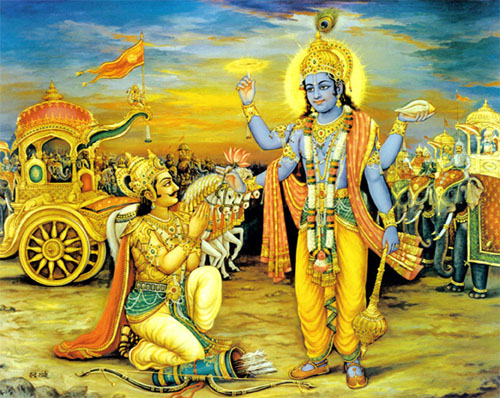Hemant Dharmat
During his discourse with Arjun in their chariot stationed amidst the battlefield of Kurukshetra with the contending forces in battle array, just before first salvo was to be fired in the epic War of Mahabharta, Lord Krishna said, “You have the right to perform your duty but never over fruits of your work. Have no attachment with the results of your actions. And do not also be disinclined to function” (Chapter 2, Verse 47). Working relentlessly without any desire or attachment to the results of your karmas is the underlying principle. The verse may be read with the following so as to grasp its correct meaning: “The work, that is commenced out of delusion, without considering the consequences, loss, violence and one’s own competence is called ‘Tamas’ i.e. a dark deed” (Chapter 18, Verse 25). One is required to dutifully obey and carryout official orders of the superior authority, which as per ones’ own perception may have pleasant or unsavory outcome. If there is no liberty for making personal decisions, one would remain untouched by the associated ‘punya’ and ‘pap’ provided one carries out ones duties completely unattached to the results. Renunciation to the fruits notwithstanding, one has to perform his bounden duties with utmost dedication and sincerity. However, where an individual is vested with decision making powers, he must let better sense prevail and desist from adopting evil ways or treading an unrighteous course. Lord Krishna said, “Those with malicious intent, evil doers, cruel, and wicked, I repeatedly cast them in demonic species” (Chapter 16 Verse 19).In the Mahabharta War, Lord Krishna had punished Ashavathama to suffer agonizing pain till eternity for his evil attempt to kill Pandava’s unborn heir in mother’s womb.A karma begun thoughtlessly, which not only during working stages could be harmful, but would also be disastrous towards the end for oneself, coworkers and the society; is said to be the product of ‘Tamasik’ mindset. Therefore, before initiating work, one must consider all the pros and cons; loss to himself and to others; would it cause violence resulting in injury or death of fellow human beings; if any species would perish in the process; what precautions could be taken to prevent someone from being hurt or killed; would it degrade environment irreparably or have detrimental effect on humanity and whether one has the necessary ability, wherewithal and resources to accomplish the karma. Once the aforementioned issues are taken care of, one may chalk out strategy, work out plans and initiate action without the least attachment to its fruits. For, our action done without forsaking attachment with the results; causes tension in this world and binds us beyond to the cycle of deaths and births. Lord Krishna said, “O mighty (Arjun)! The selfless worker who neither bears malice towards anybody nor longs for anyone merits being considered a sage at all times; because the one who is free from the opposites of likes and dislikes is comfortably released from bondage” (Chapter 5 Verse 3). “Whoever perceives all actions being performed in every possible manner by nature alone and thinks him as non-doer, has the right perception” (Chapter 13 Verse 29). “Who is endowed with ‘sattavguna’ (positive outlook), and has unsuspecting mind; he is considered wise and his renunciation as genuine; if he is neither inimical towards uninteresting karma nor is attached to interesting act” (Chapter 18 Verse 10). “For it’s just not possible for anyone to completely abandon all karmas. So whoever relinquishes the fruits of his actions is called a renouncer” (Chapter 18 Verse 11). “Attaining ‘Gyan’ (knowledge of scriptures) is better than ‘Abhayas’ (practices of Yoga, Pranayama etc. without spiritual awareness); meditation on My form is better than ‘Gyan’; and relinquishing attachment to the fruits of all the obligatory duties is indeed better than meditation; for lasting peace is attained through renouncement of the fruits of ones ‘karma’ (Chapter 12 Verse 12). “Therefore, always perform your duty properly, but without attachment to its results. For, the one who continues to undertake duties without attachment to the fruits, achieves Supreme Destination”. (Chapter 3, Verse 19).
“But the person who remains absorbed in meditation of the Self, finds ecstasy in the Self and is content with the Self; he has no duty to perform” (Chapter 3, Verse 17). Lord Krishna said, “Bharata! Just as the unwise perform their duties with attachment, so should the wise person devoid of all desires undertake action for peoples’ welfare” (Chapter 3, Verse 25).Because the visible world is transient, everything around us is losing its sheen every moment. Our parents, brothers, sisters, spouse, children, close relatives and friends, none would stay with us forever. All our possessions of which we are so very proud of belonged to someone else before, these would either perish during our lifetime or would be owned by another person when we are no more. One would even have to cast off the ageing body someday. Nothing in this universe is eternal except the Self. Therefore, the sage who has realized the inviolability of the Self and remains ever lost in its glory, is not obliged to work. But just as our hearts beat and our eyelids blink without our intention; so also a sage devoid of all desires and ever absorbed in his Self keeps doing something or the other for humanity’s wellbeing.
Trending Now
E-Paper


